Friday, June 24, 1966 › Sunday, June 26, 1966
1966 Germany Tour
By The Beatles
Last updated on December 20, 2023
Friday, June 24, 1966 › Sunday, June 26, 1966
By The Beatles
Last updated on December 20, 2023
The Beatles travel from Essen to Hamburg
Jun 26, 1966
The Beatles travel from Munich to Essen
Jun 25, 1966
The Beatles travel from London to Munich
Jun 23, 1966
Brian Epstein announces The Beatles’ 1966 tours
Mar 02, 1966
A day after they completed the recording and mixing of the “Revolver” album, The Beatles took a flight from London to Munich, to start the first leg of their last world tour, which would bring them to West Germany, Japan and the Philippines, and the USA.
From Wikipedia:
The English rock group the Beatles toured West Germany, Japan and the Philippines between 24 June and 4 July 1966. The thirteen concerts comprised the first stage of a world tour that ended with the band’s final tour of the United States, in August 1966. The shows in West Germany represented a return to the country where the Beatles had developed as a group before achieving fame in 1963. The return flight from the Philippines to England included a stopover in Delhi, India. There, the Beatles indulged in two days of sightseeing and shopping for musical instruments while still under the attention of the press and local fans.
The concerts were well attended yet provided the band with little in the way of artistic fulfilment. The programme was in the package-tour format typical of the 1960s, with two shows per day, several support acts on the bill, and the Beatles’ set lasting around 30 minutes. The band’s setlist included their new single, “Paperback Writer“, but no songs from their recently completed album, Revolver. Often marked by poor playing, the shows highlighted the division between what the group could achieve when performing live as a four-piece with inadequate amplification and the more complex music they were able to create in the recording studio. Concerts at the Circus-Krone-Bau in Munich and the Nippon Budokan hall in Tokyo were filmed and broadcast on local television networks.
The tour signalled a change in the Beatlemania phenomenon, as harsh measures were used to restrain crowds for the first time and the band became a symbol of societal division between conservative and liberal thinking. The bookings at the Budokan, a venue reserved for martial arts, offended many traditionalists in Japan, resulting in death threats to the Beatles and a heightened police presence throughout their stay. In Manila, the band’s nonattendance at a social engagement hosted by Imelda Marcos led to a hostile reaction from citizens loyal to the Marcos regime, government officials and army personnel. The Beatles and their entourage were manhandled while attempting to leave the country and forced to surrender much of the earnings from the group’s two shows at the Rizal Memorial Stadium.
On their return to London, the Beatles were outspoken in their condemnation of the Philippines. As a result of the events in Manila, the band lost faith with their longtime manager, Brian Epstein and made the decision to end their career as live performers that year. By contrast, the stay in Tokyo established an enduring bond between the Beatles and Japan, where each of the band members visited or performed in the decades following the group’s break-up in April 1970.
Background
“… when London was the best place on earth and they were the best people to be, they had to do the one thing they wanted to do the least; they had to leave. It was summer and it was written in the gospel according to Brian that in summer they went out on tour.” – Former Beatles assistant Peter Brown, 1983
Brian Epstein, the Beatles’ manager, had intended that 1966 would follow the format of the previous two years, in which the Beatles had made a feature film with an accompanying soundtrack album, toured in North America and select countries during the summer months, and then recorded a second album for a pre-Christmas release. Following the group’s UK tour in December 1965, however, the band members decided to reject the planned film project, an adaptation of Richard Condon’s novel A Talent for Loving, for which Epstein had purchased the film rights. The band therefore had an unprecedented three months free of professional engagements. The group resumed work in early April, when they began recording Revolver, an album that reflected a more experimental approach as well as the increasing division between the music they made as live performers and their studio work. The band briefly interrupted the sessions to perform at the NME Poll-Winners Concert on 1 May.
During the early months of 1966, Epstein arranged bookings for the Beatles to play a series of concerts beginning in late June, in West Germany, Japan and the Philippines. These locations comprised the first leg of a world tour that would resume on 11 August, when the group embarked on their third US tour. When discussing a possible itinerary in New York on 3 March, Epstein had said that the Beatles were likely to play in Britain also but made no mention of the Philippines. Concerts in what was then the Soviet Union were also under consideration.
The band completed work on Revolver on 22 June and flew to Munich the following day to begin the tour. According to author Jonathan Gould, the Beatles would gladly have stayed in Britain rather than continue to perform in halls filled with screaming fans. The band’s dedication to completing Revolver, together with their lack of touring experience since December 1965, ensured that they were under-rehearsed for the concerts. Author Philip Norman writes that the knowledge that they would not be heard above the hysteria of their fans was another factor behind the group’s failure to rehearse adequately for the tour.
Repertoire, tour personnel, and equipment
Given the complexity of their new recordings, the band did not include any of the songs from Revolver in their 1966 setlist. Author and critic Richie Unterberger writes that this omission has been interpreted as laziness by some commentators, yet it was in keeping with the Beatles’ policy not to perform any unreleased material. Their current single, “Paperback Writer“, was included, but as with the few selections from Rubber Soul they performed live – “Nowhere Man” and “If I Needed Someone” – the Beatles were unable to capture the intricacies of the multi-track recording in concert. The set comprised eleven songs and lasted just over 30 minutes. Aside from the introduction of “Paperback Writer” (in place of “We Can Work It Out“), it was relatively unchanged from the 1965 UK tour. “Rock and Roll Music” became the opening song, while Ringo Starr’s moment as the featured singer, “Act Naturally“, was replaced by “I Wanna Be Your Man“. The Beatles played “Yesterday” – which had previously been a Paul McCartney solo performance, on acoustic guitar – with electric group backing for the first time. According to author Jon Savage, “It was a strange set … Rockers were interspersed with slow or mid-paced numbers, preventing any excitement from building.”
The Beatles’ entourage consisted of Epstein, press officer Tony Barrow, road managers Neil Aspinall and Mal Evans, and Peter Brown, Epstein’s assistant. Robert Whitaker, a photographer who regularly worked with the Beatles during this period, documented their time in Germany and Japan. In addition, Vic Lewis, Epstein and Brown’s colleague at the management company NEMS, joined the tour party in Japan, having helped arrange the Far East concerts. The band’s chauffeur, Alf Bicknell, was also present in Tokyo and Manila.
The Beatles’ main instruments were Epiphone Casino guitars for John Lennon and George Harrison, McCartney’s Höfner “violin” bass, and Starr’s Ludwig drum kit. After adopting the Epiphone as his stage guitar for 1966, beginning with the NME Poll-Winners Concert, Lennon continued to use it throughout the Beatles’ career. The band used new 100-watt Vox amplifiers throughout the tour. Harrison played his Rickenbacker 360/12 guitar on “If I Needed Someone”, while a photo taken by Whitaker shows that Harrison’s Gibson SG and McCartney’s Rickenbacker 4001 were also among the guitars they took to Japan.
West Germany – Munich and Essen
The concerts in Germany were the Beatles’ first in that country since December 1962, when they played a New Year’s Eve show as their final engagement at the Star-Club in Hamburg. The principal reason that they had not returned in the past four years was the threat of a paternity claim by a young Hamburg woman. The 1966 visit was presented by Karl Buchmann Productions and sponsored by Bravo magazine. At the Beatles’ insistence, the venues were restricted to a maximum capacity of 8,000 seats, which meant that Bravo was making a loss on the outlay for the tour. The band arrived in Munich on 23 June, exhausted from their recent work in the studio, and booked into the Hotel Bayerischer Hof, where they gave a short press conference. The support acts for the German concerts were Peter and Gordon, Cliff Bennett and the Rebel Rousers and the Rattles. The latter were a German group who had performed on the same circuit in Hamburg as the Beatles in 1962.
The first shows were held at Munich’s 3,500-seat Circus-Krone-Bau at 5.15 and 9 pm on 24 June. The Beatles wore matching dark green suits with silk lapels, designed by the new Chelsea boutique Hung On You. The 9 pm show was filmed by the West German ZDF network and first broadcast locally, in edited form, on 5 July. The Beatles held a rare backstage rehearsal in advance of the concert. According to musicologist Walter Everett, the Munich concert film shows the Beatles generally playing poorly amid the noise created by their fans and humorously attempting to remember the lyrics to the final song, “I’m Down“. Author Steve Turner writes that the tour was marked by average-quality performances masked by riotous screaming and that for the first time, the hysterical crowds were subjected to violent treatment and beatings by the host nation’s police force.
The Beatles travelled between destinations by train, accommodated in luxury coaches that were normally used for visits by international heads of state, including Queen Elizabeth II’s the previous year. After arriving in Essen on 25 June, they played two shows at the city’s Grugahalle. A correspondent from Beatles Monthly magazine described the concerts as “frightening” due to the police’s subjugation of the group’s fans using tear gas and guard dogs. The band then travelled overnight to Hamburg, where they stayed at the Hotel Schloss, a former palace located well north of the city centre.
West Germany – Return to Hamburg
“Their arrival in Hamburg was highly anticipated. It was the German audiences in Hamburg who’d spotted the group’s potential and had nurtured their development from callow adolescent hobbyists to battle-hardened professionals.” – Author Steve Turner, 2016
The Beatles’ return to Hamburg was viewed as a homecoming due to their past connections with the city. On 26 June, the band played two shows at the 5,600-seat Ernst-Merck-Halle and reunited with old friends such as Astrid Kirchherr and with Bert Kaempfert, a German arranger and composer who had briefly worked as the Beatles’ producer. Lennon was heard to say during one of the Ernst-Merck-Halle concerts: “Don’t listen to our music. We’re terrible these days.” A scheduled group outing to St Pauli, the area of Hamburg where the Beatles had been based in the early 1960s, was cancelled due to the potential security risk. Lennon and McCartney nevertheless made a late-night visit to familiar sites along the Reeperbahn in St Pauli.
The band members had a mixed experience in Hamburg. Harrison later said that “a lot of ghosts materialised out of the woodwork – people you didn’t necessarily want to see again, who had been your best friend one drunken Preludin night back in 1960.” McCartney commented: “It was as if we’d mutated into something different and yet we were still just the boys. But we knew and they knew that we’d got famous in the meantime …” The Beatles had also tired of the generally inane questions put to them at press conferences throughout the German tour, with only McCartney attempting to humour the local reporters. At the between-shows press conference in Hamburg, Lennon’s impatience was palpable, leading a female reporter to ask why the band had become “so horrid and snobby”. On 27 June, the Beatles and their entourage flew from Hamburg to London’s Heathrow Airport, where they boarded a Japan Airlines (JAL) flight over the North Pole to Tokyo. […]
GERMANY IN JUNE
When the four boys visit Germany this month, three of them won’t have any problems. John, Paul and George can all speak the language — thanks to their early days in Hamburg — even if it is mostly slang! But poor Ringo will have to rely on the others because he doesn’t speak a word. Incidentally, Cliff Bennett will be playing on all five dates with the boys.
From The Beatles Monthly Book – June 1966

Triumphant Return!
Every Beatles tour starts off with well organised precision. “The party will fly to Munich from London on Thursday June 23rd via BEA flight number BE 502 departing London Airport at 11.05 a.m.”… read our instructions. But anyone who’s been on a Beatles tour before — and the Beatles Book staff have been there most times — knows better. Every Beatle person in the particular country they’re touring wants to meet and talk to the boys — who wouldn’t. But there is always a big posse of police and guards equally determined to protect their charges.
After a ninety minute trip our Comet touched down at Munich Airport and was immediately surrounded by a big crowd of aircrew, groundsmen and photographers.
The boys emerged from the plane to a battery of clicking cameras, shouted questions and hurried greetings from their press officer, Tony Barrow, who had arrived in Germany before them to prepare for their visit.
When everyone started to close in, Tony decided it was time to go, and whisked the boys and Brian Epstein into a white Mercedes which took them to the Bayerischer Hof Hotel in Munich, where several hundred fans had gathered.
Before anyone realised what was happening the Beatles were inside and safely installed in their fifth floor suite.
NEW L.P. TITLE
The boys had a bit of a problem on their hands when we joined them in their rooms — they had to do a bit of quick thinking, and come up with a good title for their new L.P.
After listening to the tracks on George’s tape recorder, we all swopped suggestions and came up with names like “Magic Circle”, “Four Sides To The Circle”, “Beatles On Safari” and “After Geography” (a Ringo pun on [The Rolling Stones’] “Aftermath”) — but still no luck.
Then it was time for the press conference. Everyone made for the lift, which was designed to take ten people. Fifteen crammed in, the door closed and the whole thing jammed between floors for ten minutes, whilst those downstairs waited and wondered and everyone in the lift wondered and waited.
The lift was repaired, the Beatles were freed and the press conference began. Photographs were followed by questions, followed by more photographs, and then a presentation of a trophy by Bravo magazine, the organisers of the tour. Everyone happy, the boys returned to their suite to practise. After all, they were going on stage the following day to perform numbers they hadn’t played together for six months.
The evening was spent quietly with just a quick dip in the hotel swimming pool.
The boys were up and around mid-day on Friday, as they still weren’t happy with their act. We left them in the afternoon to practise and made our way to the Circus Krone where they would make two appearances.
Cliff Bennett and the Rebel Rousers opened the show, followed by Germany’s Rattles and then Peter and Gordon.
Zero hour approached with the boys looking immaculate in their new bottle green suits with silk collars, underneath which they wore lime and yellow striped crepon shirts with large collars and no tie.
They dashed on stage to a terrific ovation and immediately launched into “Rock ‘n Roll Music” followed by “She’s A Woman”.
The boys had obviously decided that they were going to give their audience the old favourites they all knew. The rest of the act went as follows: “If I Needed Someone”, “Day Tripper”, “Baby’s In Black”, “I Feel Fine”, “Yesterday”, “I Wanna Be Your Man”, “Nowhere Man”, “Paperback Writer” and “I’m Down”.
FANTASTIC
There was no doubt about it, the Beatles were as fantastic as ever, and their second performance was an even greater success — it was one of the most exciting shows I’ve ever seen the boys give, and they were all very happy and elated when they returned to their hotel to talk the night away.
After a very late night everyone stumbled into the garage under the Bayerischer Hof the following morning where a fleet of seven white Mercedes awaited to take us to the station where we would board the train to Hamburg, stopping en route at Essen.
The boys emerged through the garage door looking surprisingly awake with the exception of John who tripped over the step — which made him all the more unsociable.
The police motorcade which escorted us was quite unnecessary at this unearthly hour of the morning, because there was only a handful of onlookers at the station.
The special train which carried the Beatles and their entourage was the same one as used by the Queen last year. The Beatles, together with Brian Epstein (who just about made the train), Tony Barrow, their press officer, Neil, Mal and Alf had their own suite of which consisted of a large dining-room, a lounge, and four bedrooms and bathrooms.
CORN FLAKES
Breakfast was served about ten o’clock and consisted of fruit juice, cornflakes (a Beatles favourite), bacon and eggs, rolls and tea and coffee. After breakfast the boys retired to their compartments to catch some sleep which was interrupted by lunch half way through, and they came back to sleep again till about three o’clock when they came through to the other compartments to chat to everyone and have a few photographs taken. Paul was wearing a beige suit with a cream shirt and a red, yellow and brown striped tie plus his yellow-tinted specs. Ringo was dressed in black slacks and polo-necked sweater with a brown suede jacket. George wore a self-striped maroon velvet jacket and John was geared in his airport departure ensemble — red and White striped trousers with a white jacket.
The train pulled into Essen around four thirty, and as off the train there was a dozen policemen panicking whilst trying to hold back people on the platform — which was laughable. Further down the platform were three men dressed as barbers in white smocks and bald-topped wigs carrying giant-sized combs. As we mounted the stairs it was obvious that the police had underestimated the crowd outside, for suddenly there was a big swoop and everyone started running including the Beatles — John thought it would be better to run the other way in the direction of the train, but as the rest of us were being hurled into cars, Alf grabbed John and threw him in on top of everyone else.
SLOW DRIVE
Again it was the white Mercedes plus police motorcade which took us on a very slow drive to the Grugehalle in Essen. The reason for driving at a funeral march pace, was so that we’d arrive after the audience had gone to their seats.
There were two dressing-rooms set aside for the Beatles — one was for the boys to change in, the other was used for lounging in.
Essen proved to be the wildest concert — John was working the audience into a frenzy by getting down on his knees and shouting “Meine Kinde” with arms outstretched. But the biggest ovation of all was when Paul announced Ringo — the crowd went absolutely potty.
After the first show everyone had a meal in the dressing room and at the same time stared in wonderment at the crowd outside. Five thousand strong wouldn’t move, they kept chanting “we want the Beatles”.
It was now time for their press conference, which followed the same pattern as the previous one, with the exception that the questions asked were even more inane.
Before going on stage John, George and Paul put in another practice for “Paperback Writer” — Paul was still very far from satisfied. The difficulty being that on record they sing a four-part harmony, yet on stage they can only manage three, and the mere fact that John’s voice was cracking up, didn’t help matters.
After the second show, which was even wilder than the first, we waited for the crowd to disperse before leaving the theatre to go back to the station where the train had been waiting.
It was about twelve thirty when we arrived at the station. A very late dinner was served about one o’clock and everyone was in excellent spirits, except poor old John whose throat was getting worse, so his evening was spent drinking lemon teas and taking lozenges. Everyone else sat round the table playing cards and trying to think up L.P. titles — again! This time Paul fancied the word “pendulum”.
STATION WELCOME
The night had passed so quickly that before you could say ‘Beatles’ we had arrived in Hamburg — at six o’clock in the morning. The boys were very surprised to see so many people at the station, especially, Bettina, a friend from the old days. But the boys barely had time to say hello before we were whisked off in a fleet of black Mercedes which took us to the beautiful Schloss Hotel in Tremsbuttel, which is about thirty miles outside Hamburg.
As soon as we arrived at the Schloss everyone just flopped into bed and slept till about one thirty, so as to give plenty of time to be ready to leave by quarter-to-three. Even by two o’clock the crowd outside the hotel had grown from a mere thirty to about two hundred, and so they shouldn’t be disappointed the boys stepped out onto the balcony, looking very fresh and wide awake.
Backstage at the Merck Halle in Hamburg it was just like a reunion. Bettina was there, and so was an old girlfriend of Paul’s named Cattia. Gibson Kempe arrived with his girlfriend Astrid, who was once the girlfriend of Stu Sutcliffe — she was greeted by all four Beatles with great warmth and affection. Bert Kaempfert popped in with his wife, and as he entered the room John sang the opening line of “Strangers In The Night”.
As you can imagine, Hamburg held an extra something for both the Beatles and the people who came to see them, and as usual they went down fantastically with just that extra something.
After two very exhausting shows and a press conference it was back to the hotel for a quiet evening with just a couple of friends and not as everyone had anticipated an evening at the Star Club — for reasons which I think are quite obvious. And so the Beatles’ return to Germany ended.
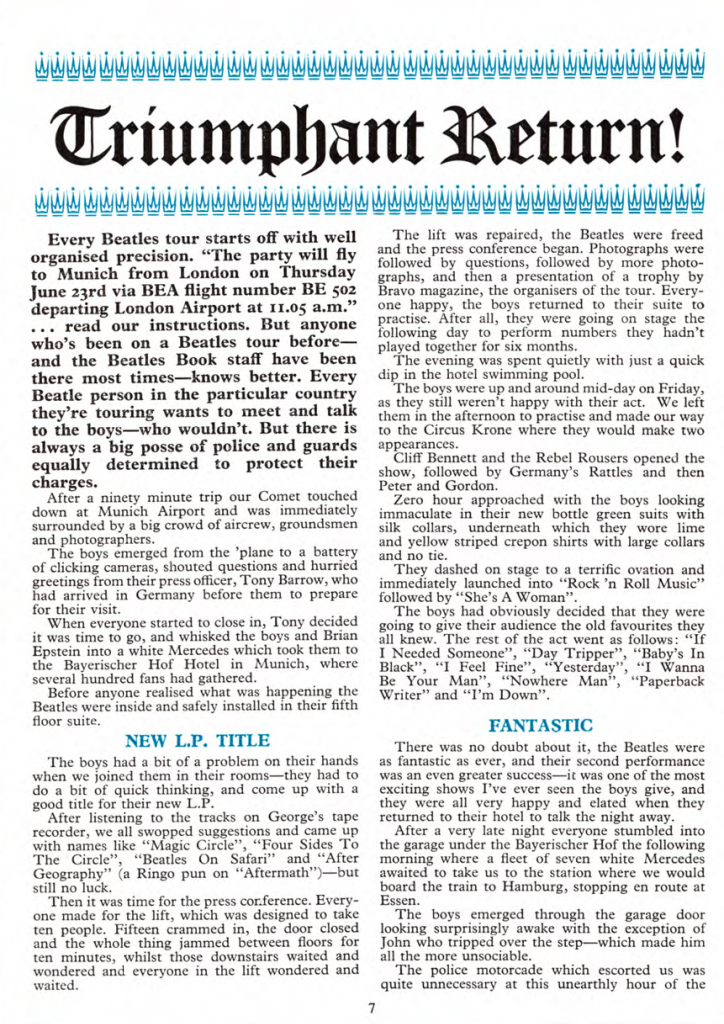
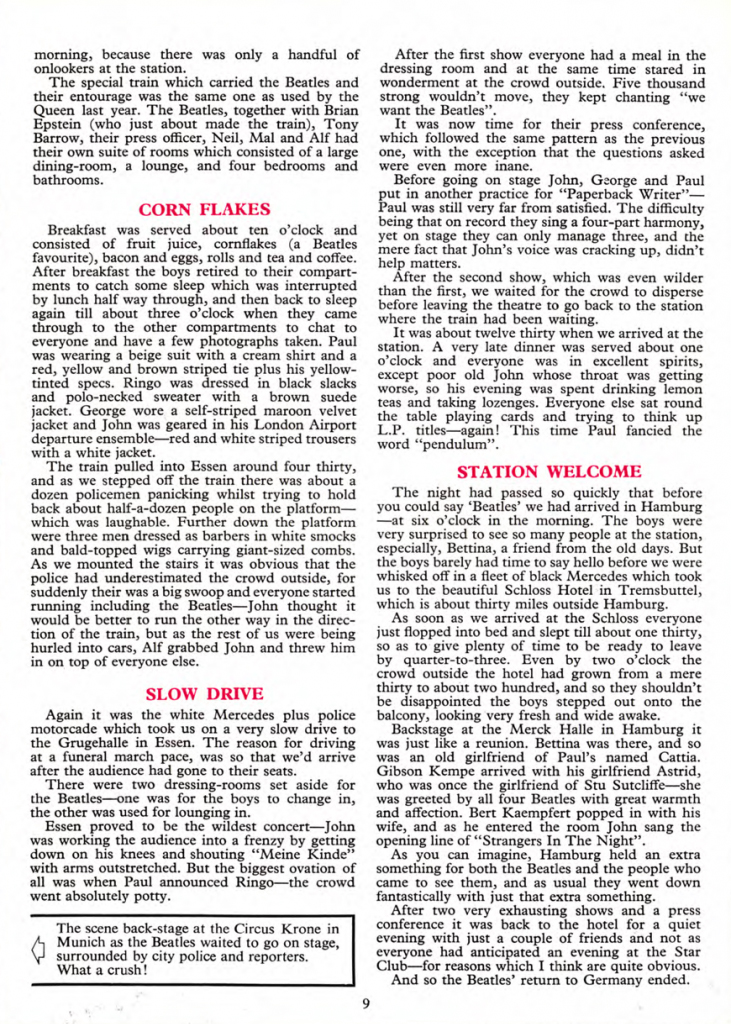
BACK TO THE SCENE OF MISERY & POVERTY
THE letter written by John Lennon summed it all up: it was sent by him some years ago to the late Beatle, Stuart Sutcliffe and was one of a collection handed back to him in Hamburg on Sunday. In the letter John write: “I’ve got one ciggy to last ’till Thursday”.
That’s the sort of memory the Beatles have of Hamburg — miserable poverty. On Sunday, however, they returned in triumph. They swept into the city at the head of an eight-car motorcade escorted by a dozen motorcycle policemen.
To most of Hamburg, the World Beating Beatles had arrived. But to a handful in the Grosse Freiheit — a tiny street of sordid clubs (above one of which they once lived) — John, Paul, George and Ringo were back.
And the friends they made then, one by one filtered through the militant-like German security to renew acquaintances. There was Betina, the buxom blonde who worked in the Star Club bar and who had a crush on John, “She used to call out for her favourite numbers when we were on stage — you could always pick out Betina’s voice,” John later recalled, adding, “she got me drinks when we had no money. And pills — print that!”
Friends like Cory, the attractive girl Paul once courted. Her parents own — a restaurant in the Grosse Freiheit — the street that houses the Star Club — and that was often a source of food for the hungry Beatles.
And Bert Kaempfert — the man who recorded the Beatles in their Hamburg days. He called backstage on Sunday to see them and pay his respects just like the others.
And Astrid Kirchner, the girl photographer who was engaged to Stuart Sutcliffe. She arrived with her fiancé Gibson Kempe and the little bundle of letters from John to Stu, “the best present I’ve had in years,” he said as he thumbed through them showing the occasional one to those around him. Many were in picture form — Lennon drawings that would probably fetch a fortune if they were auctioned.
So the Beatles were back in Hamburg. But apart from the friends there was little to remind the four of earlier days spent there.
THEY SANG to a crowd of more than 7,000 in the huge Ernst Merck Hall – a concrete palace they had never even seen before.
THERE WAS NO RETURN to the Star Club where their music first took its shape. “We’d like to go,” John admitted sadly, “But there’d be millions of people there and it would be no fun. We’d probably get crushed to death.”
THEY STAYED at the magnificent Schloss Hotel in Tremsbuttel — more than thirty miles from Hamburg, deep in the country. Dozens of green uniformed policemen patrolled the grounds searching out fans who had journeyed from the city and surrounding towns in the hope of sneaking a glimpse of their idols.
THERE WAS NO RETURN to the little flat over a strip club where they once lived. Although its owner had cleared out the tenant six weeks previously so that the Beatles could go back for a party, the rooms stayed empty. “Security,” the Beatle-minders explained, “we couldn’t possibly let them go there.” A pity, for the Beatles will never again see that former home. Within a month the building is to be demolished.
THEY RODE in a limousine heading the procession of vehicles which carried their entourage. The whole fleet of gleaming Mercedes cruised uninterrupted in and out of the city as the escort of white-coated outriders scaled off side roads and ordered other traffic to pull off the road until the Beaties had passed.
Their concerts were promoted by a German magazine which never rated them a mention in their Star Club days. But rumour has it that the journal paid the group so much for the concerts in Munich, Essen and Hamburg that even with capacity audiences it lost money on the “Blitztournee” as it triumphantly named the three-day tour.
Doubtless Axel Springer the German Press baron who counts the magazine amongst his collection, would willingly have paid twice the price. To buy the Beatles for three days is no small feat and worth a fortune in prestige.
I was especially interested to report the Beatles’ return to Hamburg — for it was in that city that I first met them in the autumn of 1962. I was there for a week to report Little Richard’s appearance at the Star Club and the Beatles were on the same bill.
There were friendly arguments between John Lennon and Little Richard which always ended with Lennon exclaiming “Shuddup grandfather” at the older man. But one night I heard Richard remark to the club owner, Manfred Weisledder, “Those Beatles are so good — watch them Manfred, they could be the biggest thing in the whole world.”
Manfred attached no more importance to Little Richard’s words than I did but we both recalled them well enough when I visited the Star Club last Saturday night.
Manfred also remembered a business argument with Brian Epstein shortly before they began that last season at the Star Club. The Beatles manager was demanding £250 a week for his group — half as much again as they had received before.
Manfred had said it was too much. “Nonsense,” retorted Epstein. “These boys will soon be bigger than Elvis Presley”. Weisedder didn’t believe the argument — but he paid the money.
The tall, blond German had a flood of stories to relate about the Beatles. His earliest memory of them went back to some two years before even he first employed them: “One night I saw them going into a club opposite mine. They looked so strange I turned to a friend and said, ‘they must be visitors from another planet'”.
Manfred laughed at the memory of the night he says John went on the Star Club stage naked — apart from his guitar. Though John later told me he had on a pair of shorts (“and a toilet seat around me ’ead”).
And Weisiedder recalled the day he lent them a car to drive to the seaside.
“That night I had to interrupt them on stage to ask Paul — the only one who could drive — where the car was. He said ‘oh, the engine is broken so we left it there’. A practically new £2,000 car and they had dumped it by the seaside!”
Manfred showed me a copy of his latest “Star Club News”. On the cover was a picture of Gene Vincent signing an autograph for John Lennon. “They were great fans of all rock ‘n’ rollers,” he reflected.
We talked into the early hours of Sunday morning — at a time when the luxury express train specially hired for the Beatles entourage was bearing its precious party the 300 miles from Essen to Hamburg itself. They arrived at breakfast time and went straight to bed at the hotel In Tremsbuttel.
By lunch time the crowds had gathered outside — not surprising since their magazine host had announced full details of the Beatles’ “hideaway” in a previous Issue.
I joined John, Paul and Ringo (George was a late riser) in their suite in the midst of a discussion about the title for their next LP. “We’ve had all sorts of ideas during this trip — “Magic Circles”, “Beatles On Safari” and “Revolver” — that’s the one John likes best,” Paul told me.
Minutes later they made an appearance on the hotel balcony to the delight of the crowd outside. As they walked downstairs to the waiting cars I heard John comment, “How about Betina being on the station at seven o’clock this morning? Thought she was going to ask for a number!”
The motorcade took a devious route through country roads. There were no incidents but the German police had taken no chances — outside the hall another squad of motorcycles and a number of vehicles that looked like armoured cars stood by.
The Beatles, however, made a quick and easy entrance to their backstage dressing room and were safely locked away before a gang of youths attempted in vain to storm the door aiming tear gas bombs at the police who retaliated with high powered water hoses, drenching the would-be Beatle assailants.
Then came the first show. More than ten minutes after Peter and Gordon’s act had finished the chanting, impatient audience gave the Beatles a wild reception. The group played well but John’s voice was showing that it doesn’t pay to keep out of practice for seven months — for after the Munich and
Essen concerts he could barely croak a note. It was particularly noticeable in “Paperback Writer”. Even weeks of recording sessions had failed to strengthen his voice sufficiently for concerts. This was the second warning they got about keeping in practice – in Munich I understand they had to rehearse in their hotel room for fear of forgetting their hits on stage!
Between concerts they suffered another insane press conference, answering questions like, “John, how about Ringo?” (to which Lennon replied, “I think you’re soft”). One irked woman reporter asked, “Beatles, why are you such horrid snobbies?” (to which George replied that they weren’t and that it was all in her mind). Then Paul made a little speech about how they believed in answering questions directly even if it made them unpopular. And he got a round of applause.
Then they retired to the dressing room, where the small collection of friends was waiting before the second show. I asked John about a local story that The Beatles had been “arrested” by the police on a previous visit for attempting to set fire to a club where they were appearing. He said, “That one’s got a bit twisted. We set fire to this, well this, little thing on stage and the club owner – who wanted to get us banned because we had told him we weren’t going to play there any more but were moving to the Star Club – called the police.”
Paul nodded in agreement. Then Ringo announced. “Come on chaps, let’s go and do another rock ‘n’ roll show,” in his best send-up voice.
After the show they were whisked straight back io Tremsbuttel, where invitation after invitation for them to attend a variety of parties – including one specially staged by a count at his castle in the forest – were declined. But the saddest message of all was wired on The Beatles’ behalf to Manfred Weissleder at the Star Club. It said, “Sorry we can’t make it tonight.” And in his office overlooking the Grosse Freiheit, Manfred shook his head and said, “It’s a pity, they never missed a night before…”
From New Musical Express – July 1, 1966
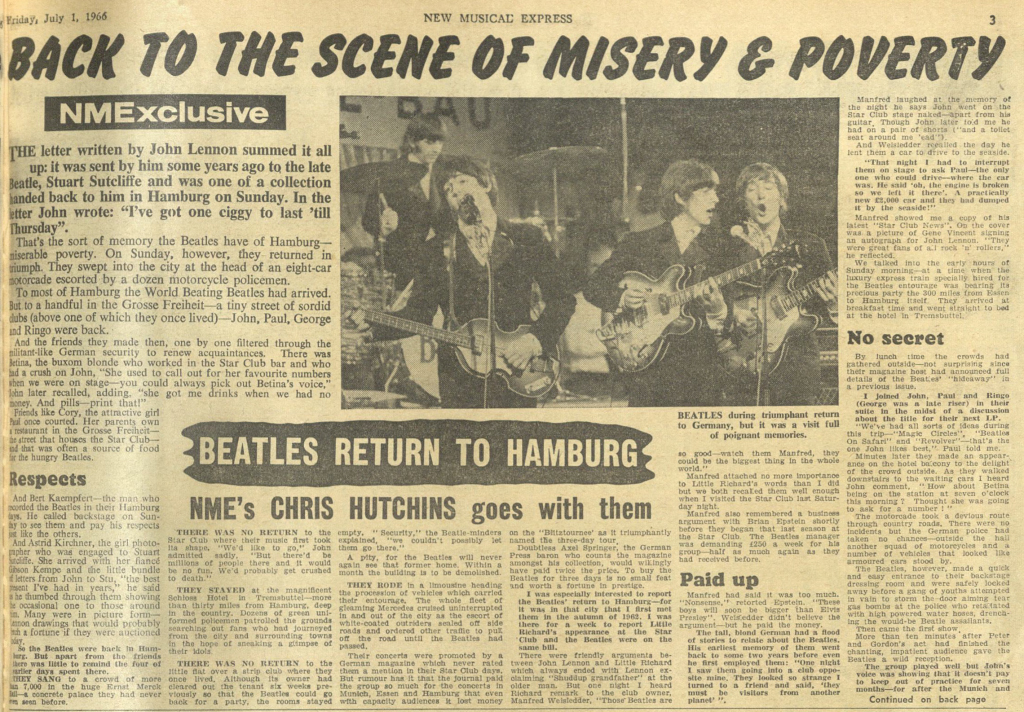
BEATLES IN GERMANY
“PLEASE. DON’T FLY TO TOKYO. YOUR CAREER IS IN DANGER… This anonymous telegram arrived in the Beatles’ Hamburg dressing-room last Sunday before their final German concert — after a staggering three-day triumphant return to the city which nursed them from obscurity into the history books.
Being used to cranks and scares, John, Paul and Ringo took little notice. But George, who worries more, kept thinking about it, and showing it round. “It makes you think,” he said soberly. “We’ve got a lot of enemies as well as friends.”
The Beatles’ return to Germany. with two concerts each in Munich, Essen and finally Hamburg, was a predictable sensation. About 30.000 fans screamed with all their Deutsch might during the four-day jaunt. And Beatlemania, with all its attendant hysteria and larger-than-life fever, gripped the country for the first time.
For Germany, this was the sentimental, romantic and often emotional return to the land where the Beatles polished themselves into the world’s top pop group and international power. For the Beatles. it was just another tour — but also a sharp reminder of their power.
The most sensational aspect of the tour was fan reaction. This time, it was the boys who went berserk more than girls. Boys got much more worked up, mentally and physically, and the German police, whose motto is simply to meet force with more force, had the time of their lives.
There were unbelievable sights as boy fans who went berserk were frog-marched backwards, punched, hurled over six-foot-high railings to cool off, or were smitten by fantastically ferocious police. Some fans were brutally wounded. But it was the law of the jungle in those concert halls, and in a military country like Germany it’s more than just tough if you don’t obey the police. It is wicked.
The Beatles remained unchanged if bemused by it all. Right now they are in Tokyo for more shows.
MEMORIES OF GERMANY? Hundreds. Crazy questions at press conferences. “What’s your opinion of the anti-baby pill?” – “It is good, of course” (Paul). “Do you speak German well?” – “Like the natives” (Paul). “Who’s the greatest, you or Cassius Clay?” – “It’s a toss-up” (Ringo). “Do you wear long pants in wintertime?” – ” No, hipsters!” (George). “What do you dream about when you’re sleeping?” “Same as anyone else.” said John. “We’re the same as you, y’know, only we’re rich.”
“Why are you such horrid snobbies?” George answered: “It’s only in your mind.” John: “Because we’re not flattering you?” Paul: “We’re just natural and we don’t pose like some people.”
MEMORIES OF GERMANY… John and Paul in daft, myopic yellow sunglasses. Ringo and George in Byrd-imitated square-lensed dark glasses, George in a crazy hat given to him by the Mamas and Papas.
The Beatles’ luxurious special train which took us from Munich to Essen and then through the night to Hamburg… John. Paul, George and Ringo in the compartment used by the Queen and Duke during their recent German trip… John in the bed the Queen slept in… George in the Duke’s.
MEMORIES OF GERMANY: Lennon’s voice cracking up in Hamburg and a friend frantically searching for honey and lemon within minutes of the boys leaping on stage. “It was the comeback after a ten-month lay-off,” said John. “That cracked it. We should never have come out of retirement!”
MEMORIES OF GERMANY… Bad and good Beatles music. A nice programme throughout. “Rock and Roll Music,” “If I Needed Someone,” “Day Tripper,” “She’s A Woman,” “Baby’s In Black.” “Yesterday,” “I Wanna Be Your Man,” “Nowhere Man,” “I Feel Fine,”Paperback,” and “I’m Down” as a great finale… George impressing the crowds to a frenzy with his German: “This is from der long-spieler ‘Beatles For Sale’.”
Their new green velvet uniforms with yellow shirts, bought at Chelsea’s Hung On You boutique… Ringo’s suit which looks like pyjamas in grey with red stripes. It floored pressmen at Munich.
Questions and more questions. “Do you polish your MBE medal?” “Every week without fail we don’t” (Ringo). “How rich are you?” “Not as rich as Harold Wilson” (George). “What’s the best beat hand in the world?” “Freddie” (Paul). “Would you be a Beatle fan if you weren’t a Beatle?” “No” (John). And a beauty when a sarcastic, “clever” reporter asked: “Ringo, what’s the time?” The Beatle answered drily: “Time you were in bed.” Laughter.
They played their new LP tape in their bedroom — on a machine with terrible reproduction. “It brings me down, listening to things that sound so bad on rotten machines,” said Lennon. Never mind, it’s a fascinating new LP and the boys spent hours trying to dream up a title for it. No luck. “Magic Circles,” “Bubble and Squeak,” “Beatles on Safari” and “Freewheelin’ Beatles” are the nearest they reached.
The album features “Good Day Sunshine,” starring Paul’s voice with George Martin on honky-tonk piano; Ringo singing a sea-shanty styled “We All Live In A Yellow Submarine,” written by John; a tremendous sitar showcase for George on a track he also wrote, “Love You To,” “I Want To Tell You,” and a sensational, moody Paul song called “For No One.” He sings beautifully and the French horn effects are terrific.
“Tomorrow Noer Knows,” the Beatles’ favourite from the new LP, is what they might call pop-free-form, with incredible electronic sounds. Even the Beatles are amazed by how revolutionary this has turned out.
“Doctor Robert,” featuring John, is a good-sounding song about which Lennon told me: “It’s all about a queer.” “Tax Man,” written and sung by George, is nice. and Paul’s special, “Eleanor Rigby,” with violins as the surprise, is another “Yesterday.” Glorious. A superb album.
Peter and Gordon and Cliff Bennett and the Rebel Rousers, plus Germany’s Rattles, completed the tour bill, and the Britons played well. “But it’s no use competing with THEM for applause,” said Peter Asher.
MEMORIES OF GERMANY… of frauleins in exquisitely embroidered skirts. They’d actually sewn on the words and music to “All My Loving” and “I Want To Hold Your Hand.”
Memories of millions of words and much music. Of fights and the seedy Reeperbahn, the Beatles’ old haunt. Of Germans going raving mad over the British Beatles.
IF ANYONE COULD HAVE MADE HITLER GET OFF THE WAR WAGON, IT WOULD HAVE BEEN JOHN. PAUL, GEORGE AND RINGO. ACHTUNG!
From Disc And Music Echo – July 2, 1966
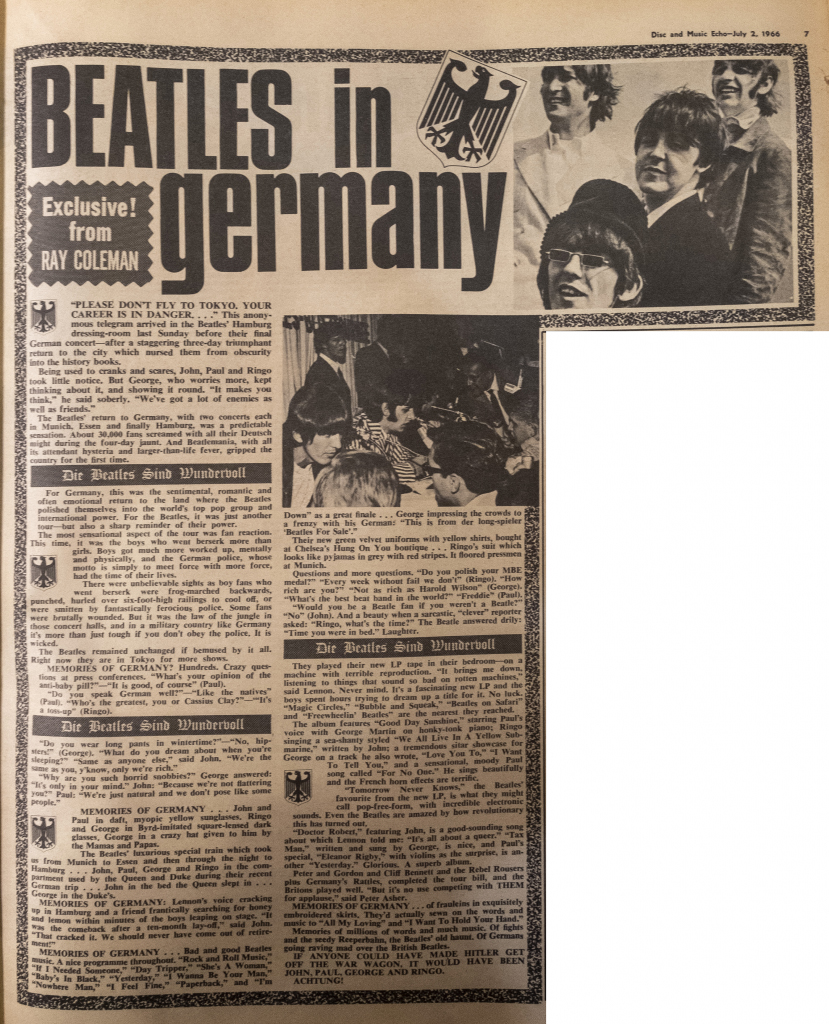
BRUTALITY AT BEATLE SHOWS
An explosive combination of the fanatical fervour of German fans and the iron first of brutal police turned the Beatles’ triumphant return to Germany into Beatlemania with one added ingredient – violence.
It built up in the easy-going Bavarian capital of Munich, the city of well-groomed women and slightly less authoritarian police, spilled out in the industrial sprawl of Essen and erupted into a blazing clash with stormtrooper police in the ugly, garish seaport of Hamburg, the town where the Beatles really started.
And yet, it was the brutality of the police and the hired bouncers at the three German venues that switched the mood of the thousands of Beatles fans from healthy, if frenzied, appreciation into ugly scenes.
The start of the 3,000 miles in three days tour was the massing at London Airport on Thursday morning of the press party, Brian Epstein, his assistant Peter Brown, road managers Neil Aspinall and Mal Evans and several photographers from a German national newspaper.
The Beatles, as usual, swept onto the tarmac in John Lennon’s gleaming black Rolls and straight on the plane, with barely a hundred Beatle fans on the airport roof for the departure.
SECURITY
No signs of Beatlemania were apparent at the British start of the race across Europe – a deceptively quiet start to one of the most hectic Beatle tours ever, thanks to the unbelievably bureaucratic pig-headedness of German officialdom and the stronger-than-ever security screen around the four lads.
The Beatles sat along with ordinary passengers in the first-class forward section of the plane. Did George and Ringo enjoy the flight? “As much as you can enjoy any flight,” replied George, wearing a hat straight from a Marx Brothers’ film.
[UNREADABLE] Hundreds of fans laid the gardens opposite the hotel – kept at bay by ultra-efficient “Stadtpolizei” – as the Beatles swept through the city in a police-escorted cavalcade of white Mercedes cars.
The fans screamed tor the group, chanting “Beat-els” throughout the afternoon and evening in spite of torrential rainstorms. The Beatles, however, were comfortably settled in their fifth-floor suite eating lunch and playing tracks from their new LP which George had taped onto a portable tape recorder.
Ringo took a quick peek out of the window and commented “It’s starting all over again”. John, in a pink shirt and light cotton jacket and trousers, confessed to the nerves that the Beatles felt before all concerts. “We’re always nervous before a show and the first night is worse still. As well as that, we haven’t played a live show for ages, so we’re a bit rusty.”
They also had to sort out the programme for the tour. “The songs that are hits here are different in some cases to Britain. The old ones we’ve almost forgotten and we’ll have to rehearse tonight to learn the words and that.”
The Beatles finished their LP before they left for the tour but had to come up with a title before they left Germany. They tossed around a few ideas, some short and snappy and some send-ups of the other titles, before abandoning the subject for a later and more relaxed moment.
But not before Paul came up with one suggestion: “Let’s call it ‘Rock and Roll Hits of ’66’. That’ll solve it.”
Backstage at the Circus Krone, venue for the opening concert. It could be backstage anywhere. The only clue to the place was the German voices booming from the inevitable TV sets in the dressing rooms. Road manager Neil Aspinall, in his seventh year with the boys, remarked that touring was a drag. “l always look forward to them. When I’m on them, they’re always a drag,” he said.
Paul and Ringo relaxed with a drink. John and George discussed music with Cliff Bennett who was also on the show while downstairs Peter and Gordon were annoyed with the almost total lack of facilities for the other artists on the bill.
BOUNCERS
In the circular body of the circus — for that’s exactly what it was – tension was building up. And at both houses, the first rumblings of the violence that was to flare later was felt. Though this time, it was kept below the surface.
As the Beatles leapt on stage for their first German appearance since Hamburg’s Star Club days, the fans went wild and bouncers were kept busy hurling fans back as they tried to scale the six-toot dais where the Beatles were temptingly in reach of the fans.
Strangely, in Germany, as in Italy and France, it’s the boys who go berserk and at the Munich concert they were screaming, singing along with the Beatles, fighting and even, at one stage, bowing down the stage as it they were Arabs facing Mecca at prayer time!
At the end of the second show, John. Paul, George and Ringo hurled themselves down the steps at the rear of the stage, leaped into the cars and shot off back to the hotel before most of the fans had had time to leave the circus hall.
And in the rooms, it was party time, in spite of the fact that they had to be up at 6.30 am to catch the special train taking them along the Rhine route to their second date — at Essen’s huge Grugehalle, set in beautiful gardens outside the city.
They made the train all right. Although Brian Epstein had to leap on while it was moving. After all, it was hired for the occasion so it had to wait for them — even though they were half-an-hour late. They burst through a side door at the station, leapt aboard and John Lennon raced up to the British musical writers and said “I’m glad y’here, I thought I was on the wrong train. See you later”
ANXIOUS
And some measure of the repute the Beatles have in Germany now is given by the fact that it was the same train that carried the Queen on her recent German visit.
The train pulled in at a small station a few kilometres from the Grugehalle — but surrounded by fans.
John hared down the station steps right into the arms of the fans. He had to make a hasty retreat shielded by Neil and Alf Bicknell, the genial third road manager. But there was only one way to the cars — through the crowd. And there were an anxious few minutes before the party was on its way.
The British press travelling in a minibus had a police escort of its own. We raced through Essen with the motorcycles forcing everyone off the road to get us through.
We arrived at the concert venue at the same time as the cavalcade – and swept through a fierce guard of leather-booted police with guns at their hips and huge muzzled dogs at their heels.
At Essen, the brutality started to show itself. At each concert, over-enthusiastic fans were dragged outside and on several occasions were beaten up by bouncers who apparently seemed to enjoy it.
Later, I asked Ringo what the Beatles thought about this sort of thing and whether they were aware of it.
MEMORIES
“We know about it and we hate it,” he said. “It’s happened in other places too. We get really mad and once John even jumped off stage to try to stop it. But you can’t, they don’t take any notice.”
After the Essen shows, the cavalcade raced back to the train for the long five-hour journey through the night to Hamburg. A meal was laid on and the Beatles ate before settling down to talk and play cards between themselves and a few other people like Eppy and Peter and Gordon.
“Paul won €25 off me,” said Peter Asher while Gordon said “I got out after the first £2, I always do.”
The party gradually ended and everyone tried to catch [… UNREADABLE]
The Hamburg concerts, rounding off the tour, were at the city’s Ernst Marck Halle, and the Beatles met many old friends backstage – including Astrid, former girlfriend of Stu Sutcliffe, the Beatle who died in Hamburg, Bettina who used to know the group in the Star Club days, Gibson of Paddy, Klaus and Gibson, the British group that recently split up, Liverpool singer Lee Curtle who works mainly in Germany now – and composer Bert Kampfaert and his wife who called to see the boys and watch the show.
Trouble flared inside and outside the Halle. Inside, there were wild scenes and the usual handling of fans by attendants. The Beatles party too ran into trouble whenever they had to move about the hall.
Outside the hall, hundreds of fans who couldn’t get in for the concerts fought the police with tear gas, believed to have been stolen, and marched about the city chanting slogans and swinging clubs. Running battles with the police sent passers-by fleeing and the police were forced to quell the trouble-makers with hoser.
DANGER
There was a sense of danger in the city. After the concert had ended and the Beatles had raced off in their limousine back to their country hotel, there were many incidents until late in the evening.
Did the Beatles go to the Star Club like everyone expected? No one knows for sure. “We haven’t planned to,” said George when I asked him during the show. “But I can’t see us getting out of this town without going.”
ON STAGE – THE SAME MIXTURE AS BEFORE
There have been whispers of new sounds for the Beatles following their recently completed LP. But in Germany, it was the formula as before – beat numbers, mingled with soft numbers that sent the fans wild.
And of course, there was a bit of the new Beatles on the first public performance of the new Beatles number one “Paperback Writer”.
They included it at every show – in fact, the numbers were exactly the same all the way through – and frankly, the harmonies on the first attempt were way off, though George did improve as the tour went on.
Nevertheless, it raises the question: what do they do if some of the clever, intricate LP tracks become big concert favorites?
Paul was in very fine voice all through the concerts, though John seems to have trouble with his voice. George and Ringo were excellent in their respective numbers. In fact, the fans thought that they should have been given more of the spotlight.
At the first show at the Circus Krone, they kicked off with a roaring version of “Rock And Roll Music”, with John taking the lead and kept the pace going with “She’s A Woman”, featuring Paul.
George stepped in for his own number “If I Needed Someone”, and after some announcements in pidgin German, they launched into “Day Tripper”, a big German hit which had the fans singing along with it.
The next number, “Baby’s In Black”, set a more lyrical mood. German fans [shouted] less during the numbers and more at the end, so it was possible to hear the words most of the time.
The Beatles whipped up the [UNREADABLE] again with “I Feel Fine”, which they played as well as they ever have done and then slowed things again for “Yesterday”. Paul sang this at all six concerts. This type of thing is his speciality and he excels at it.
“Nowhere Man”, another big German favourite came next, with John [UNREADABLE] on one of the most outstanding songs from the “Rubber Soul” album. By this time, fans were yelling for Ringo, who had them screaming for more with a jaunting “I Wanna Be Your Man”, playing some rocking drums at the same time.
In Germany, too, “Paperback Writer”, their next number, is the new single. It was the weakest number on the tour, but mainly because of the harmonies. But it swung along and got a great reception at every show.
The Beatles always close on a rocker and this time, they closed the concerts with “I’m Down”, one of their older tracks. Paul and John scream it up with the [UNREADABLE] going wild. […]
From Melody Maker – July 2, 1966
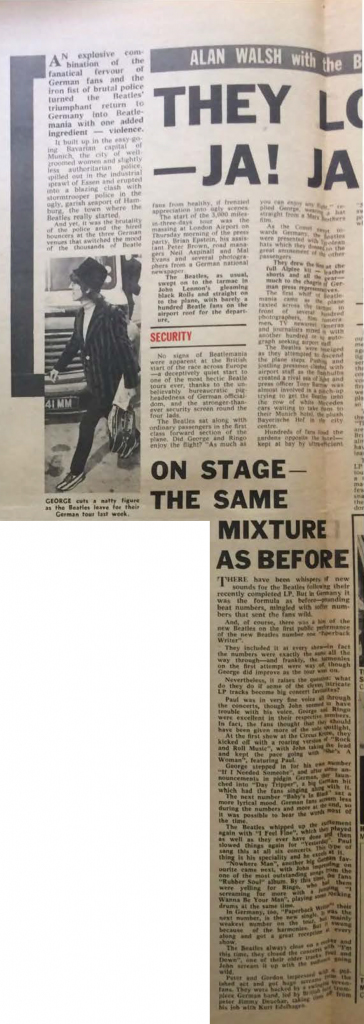
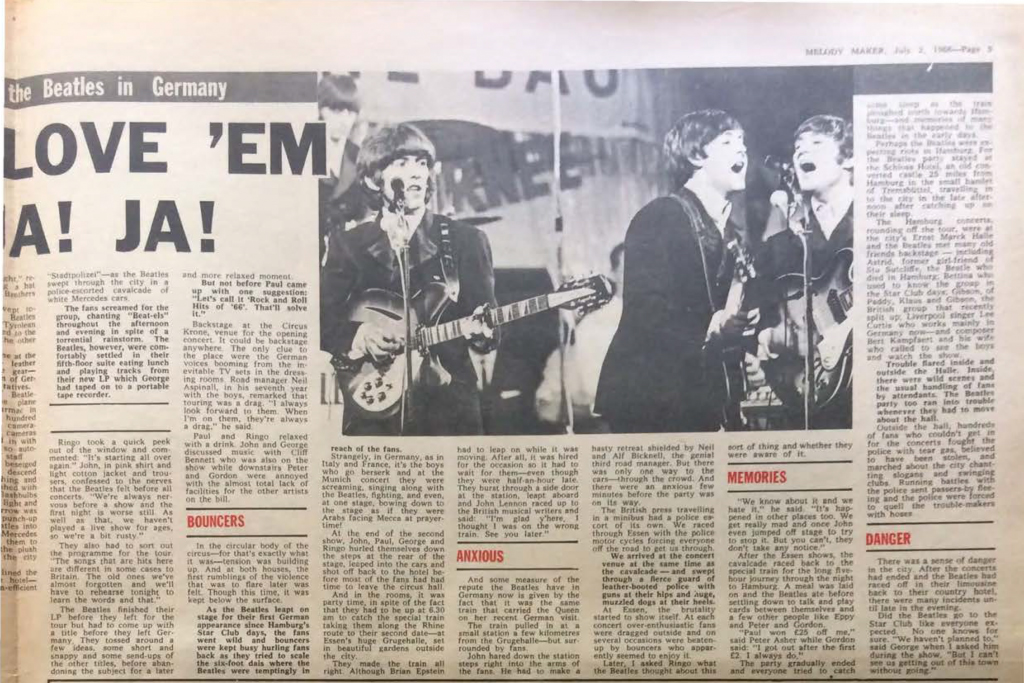
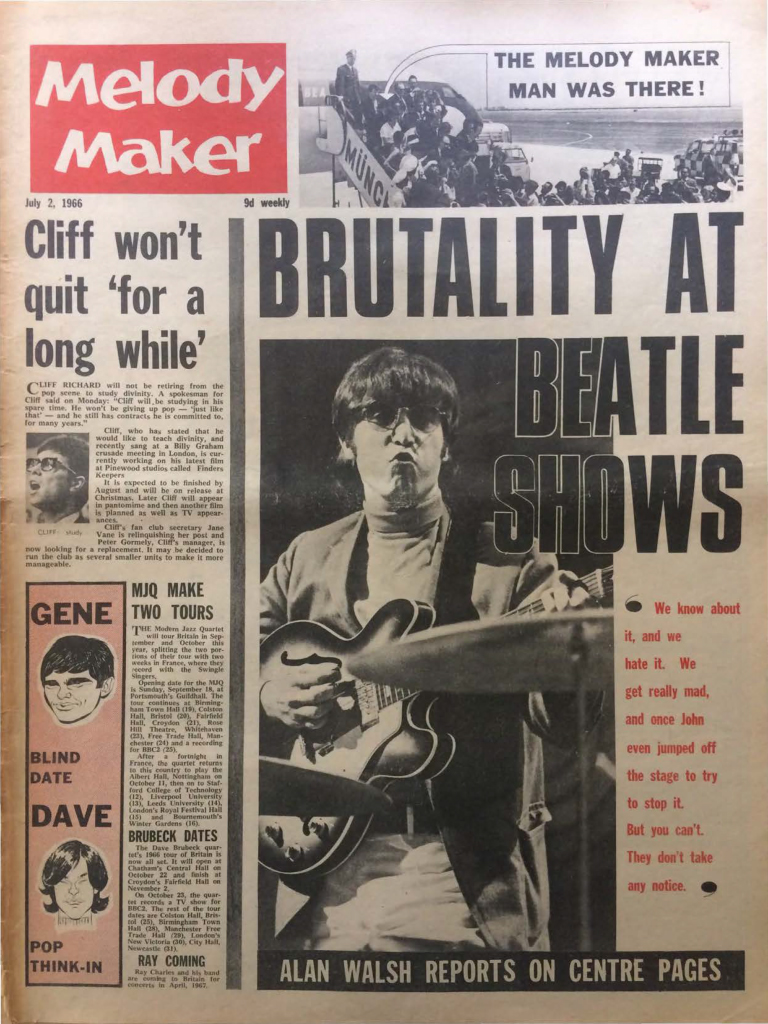
HARDLY HOLIDAY
A Beatles’ tour is always exciting. And whenever our photographer, Fiona, comes back we anchor her to a chair until she has told us every snippet of information she can remember. It always makes fascinating listening. So this week we thought it would be a good idea to let our Fab readers in on the inside story. It makes a fascinating reading.
THE Beatles’ security is so secure Fi didn’t even know she was on the same plane as them until they were all half-way across Europe. Then the curtain separating their first-class neck of the plane was pulled aside and she saw Ringo’s Tyrolean hat. So at least she knew she was going in the right direction!
“I’d booked in to stay at the same hotel as them but I could hardly get in, there were so many people outside,” said Fi. “The boys had a wing on the fifth floor and all day long there were people sitting on the other side of these glass doors just hoping to get a glimpse of them. Some even brought chairs along! I hoped we’d all do some sightseeing because they weren’t playing until the following evening. But the poor things couldn’t move. They were stuck up in their hotel rooms all the time. Once at nine in the evening they went up to the swimming pool but only Paul went in. The others just had a drink in the bar. Ringo told me he was miserable at not being able to get out for a look round. He said he was looking forward to going to Tokyo and was longing to see a bit of the country but he’d resigned himself to the fact he can’t. In Hamburg we were talking about going to The Star Club and the boys wanted to but they never made it. Brian Epstein came and we stayed until three but perhaps the police put their foot down about the boys going. They find it hard to cope with the crowds at concerts never mind a private visit — to a club at that.”
A photographer’s job is not all sweet and smile-at-the-birdie. Sometimes it’s dangerous, as Fi knows.
“Once I nearly got killed. I lost my shoe in the crowd and was trying to look for it but the crowd was going to trample me to death. I was terrified but eventually I made my way to the stage door and found I’d forgotten my pass. They let me in but only after fuss. Then another time at a press conference I had a tug-of-war with a German woman over a chair. She was very rude and in the end I let her have it (the chair, not a left hook) because I spotted a stool.
“Their press conferences are a scream. George says they’re so used to them now they can handle anything. And they need to! A woman stood up and said ‘Ringo, if Zak was eating spaghetti and threw a spoonful at your face, would it damage your face?’ Ringo said, ‘You what?’ So she repeated the whole thing. It sounds like a bad translation of German into English and yet she spoke very well. Anyway, Ringo just said, ‘I’d just wipe it off.’ And looked as puzzled as I’ve ever seen him.
“Then there was a funny man. He kept asking them things like ‘What about Hamburg?’ And ‘What about the fans?’ John said, ‘What about them then?’ and Paul said, ‘What d’you mean?’ Ringo just said, ‘You what?’ again!”
The boys are world champions at getting the best of any cross-talk like that. They never seem to lose their patience or their sense of humour.
“They were very funny one day,” said Fi. “I saw some boys in the swimming pool lowering a roll of paper in front of their window. One of The Beatles, I couldn’t make out which one, leaned out and just set it alight!
“Our journey to Essen was a bit of a mystery trip because we kept stopping at all these stations along the route for no apparent reason. When we eventually got there, there was a group of men with cardboard combs and bald wigs to present to the boys, but they were rushed through to waiting police cars so fast I don’t think they even noticed them standing there. It’s a shame things like that have to happen, the men looked so disappointed.”
“That ride into town was the greatest. Even our press mini-bus was given a police escort. We flashed through traffic lights and once along an autobahn a private car had to mount a hill to let us pass. It was thrilling. It was a thrilling tour for one girl who used to be a friend of Paul’s. She was sitting holding his hand for ages and Paul asked me to take a picture of them together for her sake. She nearly wept with joy, and kept asking me over and over again not to forget to send her the picture.”
“We said goodbye before they went on to Tokyo and I came back to London alone. The boys were still not ready to relax. They were discussing whether to go to a party they’d been invited to by some baron! John was saying, ‘We’ll go if he’s got a castle, but not if it’s in a flat!’ And the others all took up the idea and were shouting ‘Castle, si. Flat, no!’ I don’t think I could have made it anyway! I was so exhausted and was looking forward a nice long sleep on the way home.”
That’s the trouble about touring with The Beatles. The only people who can stand the pace are the boys themselves! When she arrived back at the Fab office Fiona was almost asleep so I had to feed her black coffee until she finished her story.
From Fabulous208 – July 30, 1966
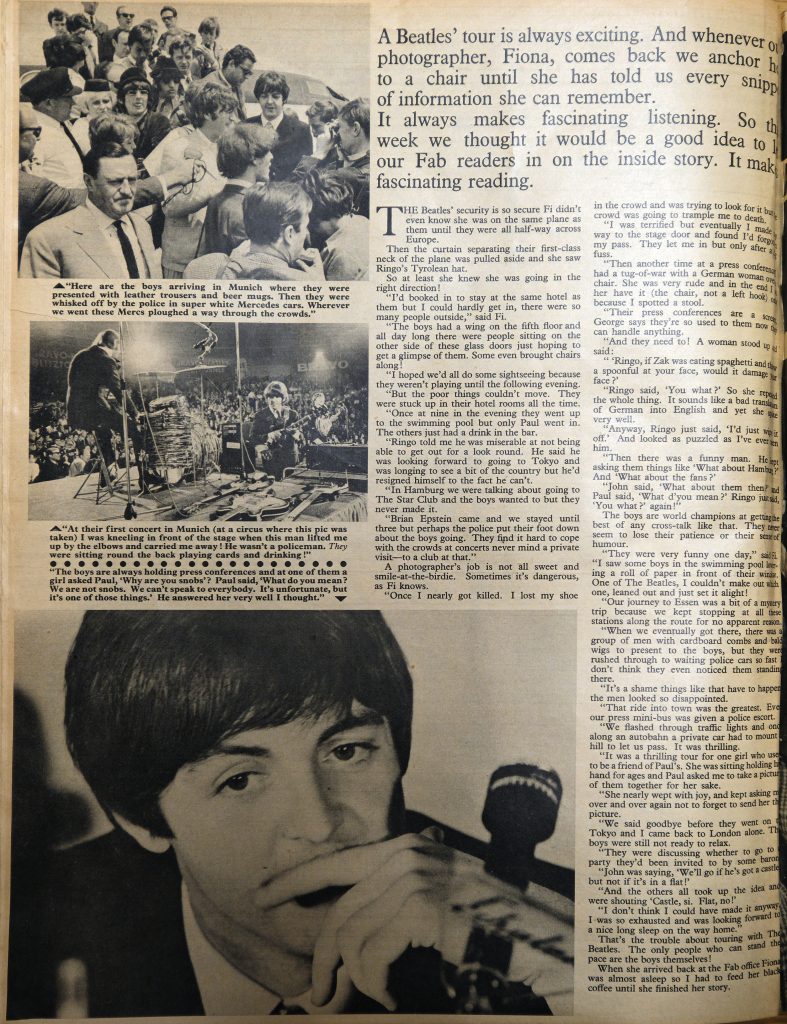
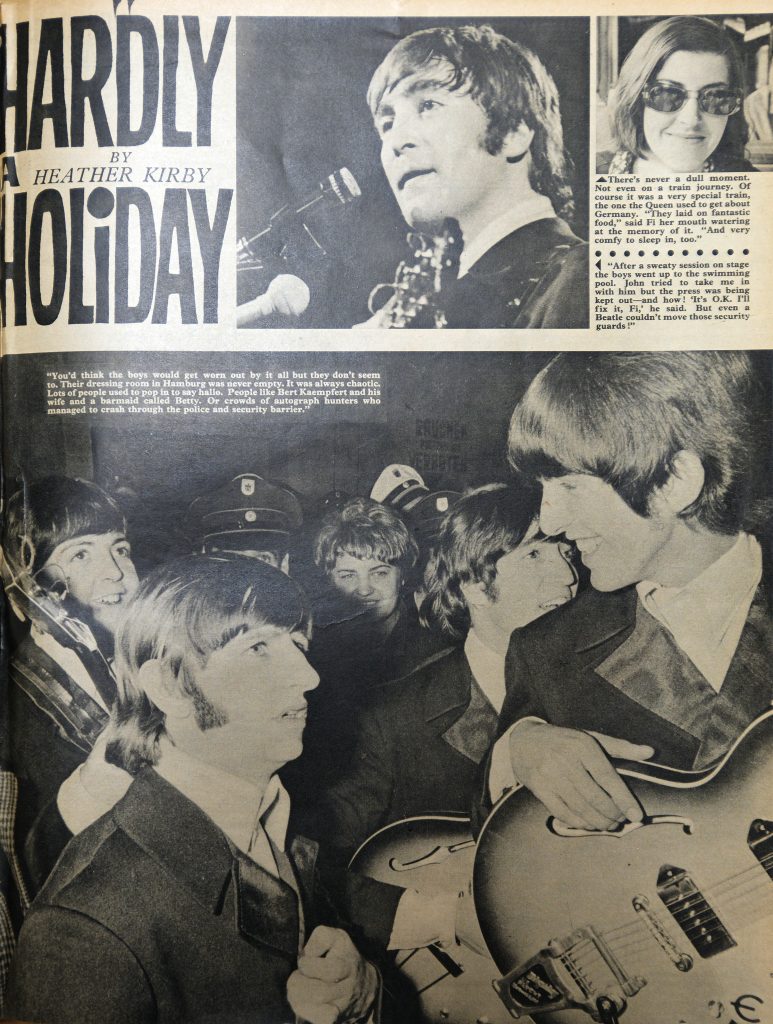
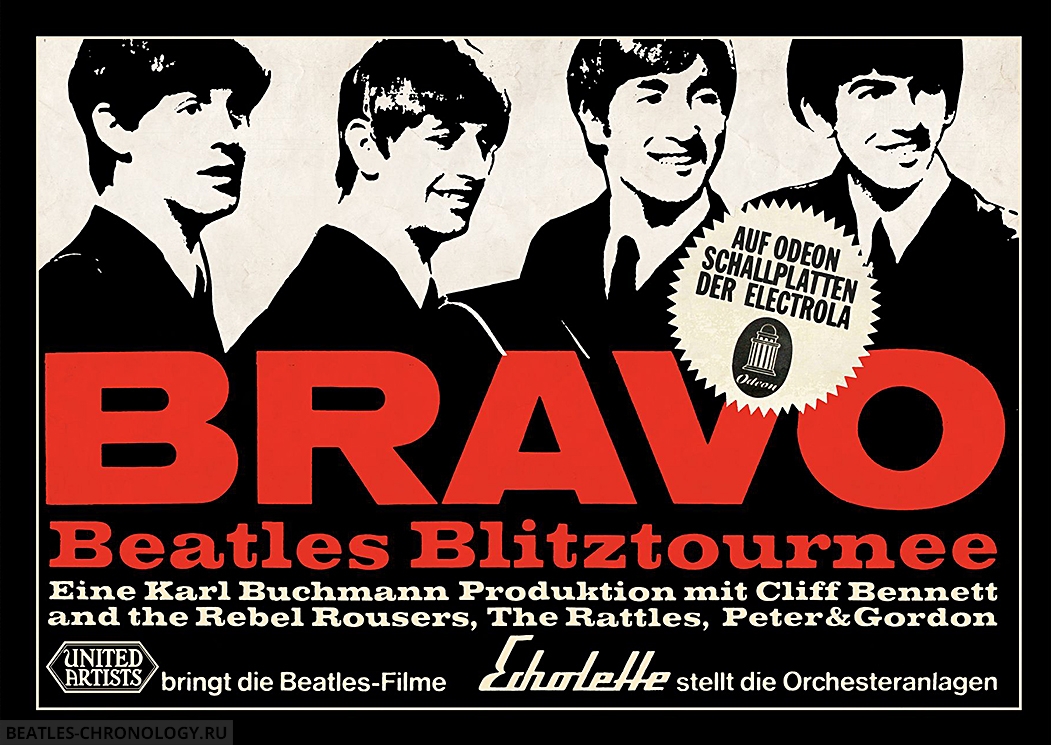
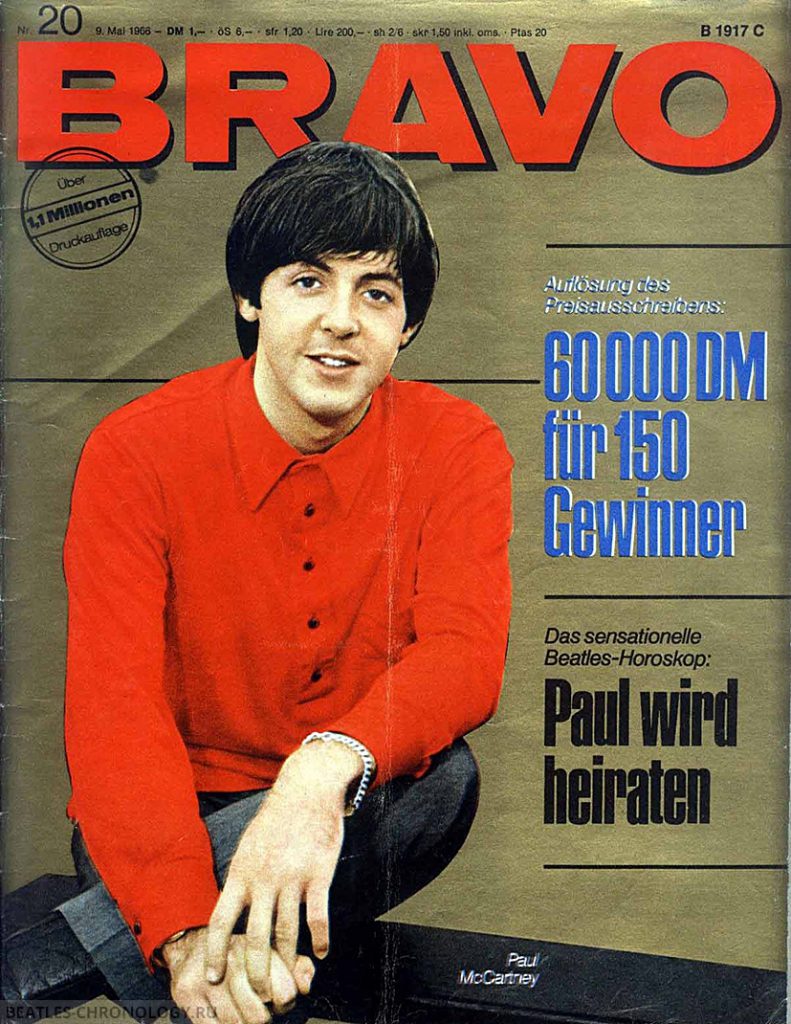
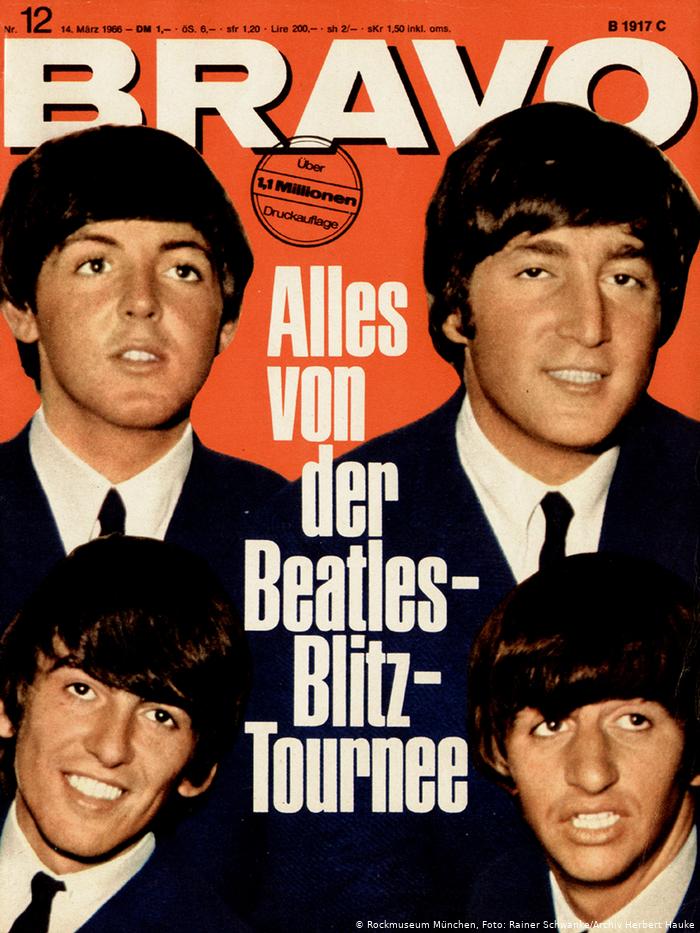
Germany • Munich • Circus Krone Building • 5:15pm show
Jun 24, 1966 • There is 1 album covering this show
Germany • Munich • Circus Krone Building • 9pm show
Jun 24, 1966 • There is 1 album covering this show
Germany • Essen • Grugahalle • 5pm show
Jun 25, 1966 • There is 1 album covering this show
Germany • Essen • Grugahalle • 9pm show
Jun 25, 1966 • There is 1 album covering this show
Germany • Hamburg • Ernst Merck Halle • 7pm show
Jun 26, 1966 • There is 1 album covering this show
Germany • Hamburg • Ernst Merck Halle • 3pm show
Jun 26, 1966 • There is 1 album covering this show

Notice any inaccuracies on this page? Have additional insights or ideas for new content? Or just want to share your thoughts? We value your feedback! Please use the form below to get in touch with us.